Health
Stuffy nose? Common OTC nasal decongestants with phenylephrine don’t work in tablet form, experts say

As frustrating as colds and allergies may be to those who suffer from them, even more sobering is the notion that popular remedies we think are treating them may be ineffective at relieving our stuffy noses.
The U.S. Food and Drug Administration (FDA) is deliberating about removing the designation “generally recognized as safe and effective,” or “GRASE,” for the common ingredient known as phenylephrine in popular nasal decongestants after an advisory panel to the agency found on Tuesday the drug is ineffective when taken orally.
The GRASE designation allows manufacturers to market phenylephrine without filing an FDA application.
COVID, FLU AND RSV VACCINES ARE ALL AVAILABLE THIS FALL: SEE WHAT SOME DOCTORS RECOMMEND AND WHY
Their impending decision could upend the market for the cold and allergy industry, which generated almost $1.8 billion in sales last year, according to data presented by FDA officials.
Companies may be required to remove oral decongestants containing phenylephrine from shelves or reformulate them without the ingredient.
Popular remedies we buy at the drugstore and think are treating our cold and allergy symptoms may be ineffective at relieving our stuffy noses, according to an announcement this week from the FDA. (Kurt Knutsson)
“The FDA held this advisory committee meeting to seek input from the advisory committee on new data on the effectiveness of oral phenylephrine as a nasal decongestant that have become available since the agency last examined the issue,” an FDA spokesperson told Fox News Digital.
Phenylephrine is an ingredient in common over-the-counter (OTC) cold and allergy medications, such as Dayquil, Mucinex, Benadryl Allergy Plus Congestion and Sudafed PE.
The 16-member committee unanimously voted “no” to the following question: “Do the current scientific data that were presented support that the monograph dosage of orally administered phenylephrine is effective as a nasal decongestant?”
FAUCI ‘CONCERNED’ IF PEOPLE WON’T COMPLY IF MASKING RECOMMENDATIONS RETURN: ‘I HOPE’ THEY ‘ABIDE’
The FDA previously reviewed the topic in 2007, ultimately deciding to keep the drug on the market at the time — despite a systemic review that year finding “insufficient evidence that oral phenylephrine is effective for nonprescription use as a decongestant.”
The 16-member committee unanimously voted “no” to the following question: “Do the current scientific data that were presented support that the monograph dosage of orally administered phenylephrine is effective as a nasal decongestant?”
Since 2007, several large placebo-controlled trials provide more definitive research that there is no evidence that standard and higher doses of oral phenylephrine relieves nasal decongestion.
How does phenylephrine work?
The nose is often the first line of defense when the body is trying to beat a respiratory virus.
When we have a cold, the immune system sends white blood cells to fight the infection in our nasal passages. This can lead to a stuffy nose and mucus production.

“It just isn’t effective when swallowed, since more than 99% of the dose is inactivated and doesn’t get into the bloodstream,” said one expert about phenylephrine. (iStock)
Phenylephrine works to decrease the congestion by constricting the blood vessels in our nose and sinuses to reduce swelling.
One adverse side effect is an increase in blood pressure at higher doses.
“It just isn’t effective when swallowed since more than 99% of the dose is inactivated and doesn’t get into the bloodstream,” Leslie Hendeles, Pharm.D., professor emeritus in the College of Pharmacy at University of Florida, based in Gainesville, told Fox News Digital.
“There should be no concern on the part of patients since there are many effective alternatives, including a topical nasal spray containing phenylephrine.”
Once we ingest phenylephrine, it gets inactivated after it passes through the liver and by gut enzymes, so there is not enough drug left by the time it reaches our nose.
NEW COVID SUBVARIANT, ERIS, IS NOW MOST COMMON AND FASTEST-SPREADING IN US: ‘NEVER GOING AWAY’
Although phenylephrine is not effective orally — it is effective when administrated in alternative ways, the pharmacist explained.
Phenylephrine is effective via non-tablet routes
These include topically as a nasal spray, as eye drops to dilate pupils, and intravenously into the bloodstream to reverse low blood pressure during surgery.
“Spraying phenylephrine, or the longer acting oxymetazoline, directly into the nose produces about 1 million times more drug in the nasal mucosa than swallowing it,” he added.
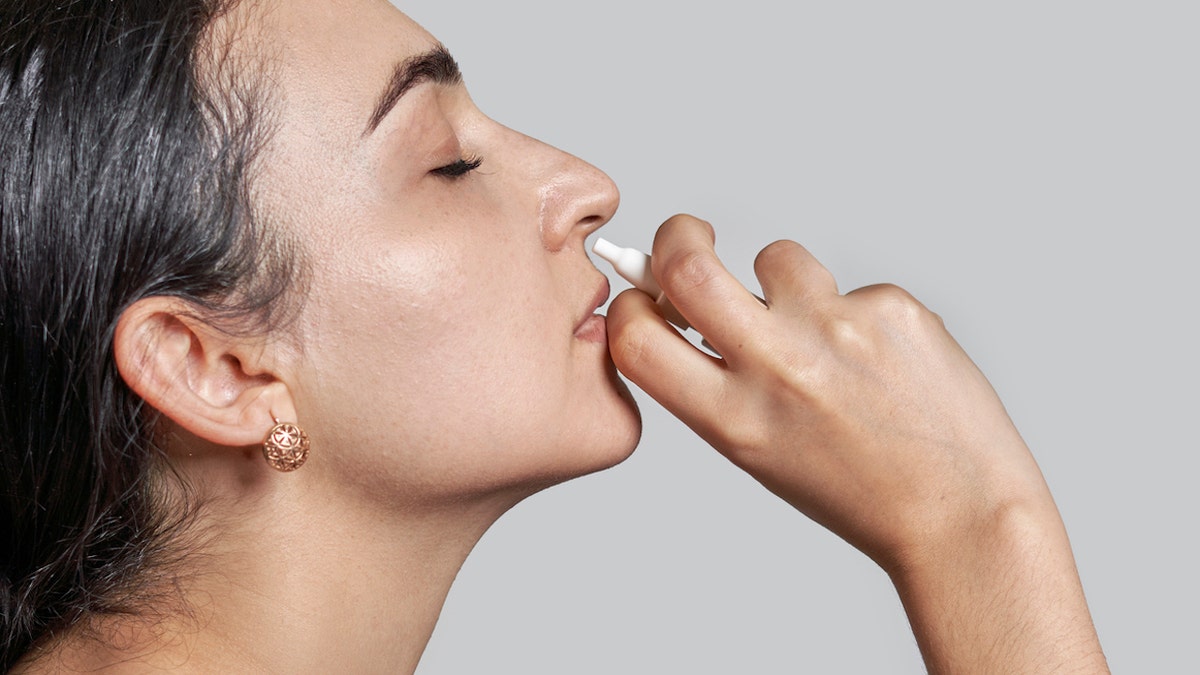
“Spraying phenylephrine, or the longer acting oxymetazoline, directly into the nose produces about 1 million times more drug in the nasal mucosa than swallowing it,” a pharmacist said. (iStock)
In 2015, Hendeles, together with another one of his colleagues, petitioned the FDA to reevaluate the decision on allowing oral phenylephrine in nasal decongestants.
This prompted the FDA’s current advisory meeting.
DOCTORS URGE VACCINATIONS AHEAD OF THIS YEAR’S FLU SEASON, WHICH COULD BE ‘FAIRLY BAD,’ EXPERTS SAY
“The FDA Review Team has concluded that oral phenylephrine is not effective at relieving a stuffy nose from either a cold or allergy and the Nonprescription Drugs Advisory Committee has just voted unanimously in agreement with the FDA,” Hendeles told Fox News Digital.
“There should be no concern on the part of patients since there are many effective alternatives, including a topical nasal spray containing phenylephrine.”
FDA detailed its next steps
Now that the advisory committee has made its recommendation, the FDA will be reviewing cold, cough, allergy, bronchodilator and antiasthmatic drug products for OTC human use (OTC Monograph M012).
An OTC Monograph establishes the active ingredients under certain categories that an OTC drug is GRASE for its intended use, according to the FDA website.
“If the FDA determines that oral phenylephrine is no longer considered [GRASE] under the conditions of use in [OTC Monograph M012], the FDA would issue a proposed order to amend OTC Monograph M012 by removing oral phenylephrine as a GRASE active ingredient from that monograph,” a FDA spokesperson told Fox New Digital.

The FDA will be reviewing cold, cough, allergy, bronchodilator and antiasthmatic drug products for over-the-counter human use. (iStock)
People will have the opportunity to comment on the proposed order.
“During this time period, the marketing status of oral phenylephrine would not change,” the FDA spokesperson clarified.
CLICK HERE TO SIGN UP FOR OUR HEALTH NEWSLETTER
The Consumer Healthcare Products Association (CHPA), which represents leading manufacturers and marketers of OTC drugs, expressed caution before the FDA makes a final decision.
“We are disappointed by the outcome of today’s FDA Advisory Committee meeting because its non-binding recommendation is at odds with the numerous clinical trials and previous regulatory determinations affirming oral phenylephrine (PE) as a safe and effective decongestant at its labeled dose,” said Scott Melville, CHPA president and CEO, on Tuesday in a September 12 statement shared with Fox News Digital.
He warned about “significantly negative unintended consequences associated with any potential change in oral PE’s regulatory status.”
“The FDA has no further information to provide at this time regarding the timing of any decision the agency may make following the advisory committee meeting,” an FDA spokesperson told Fox News Digital.

Health
Meghan Trainor Swaps Lyrics After Weight Loss + Opens up About Mounjaro

Use left and right arrow keys to navigate between menu items.
Use escape to exit the menu.
Sign Up
Create a free account to access exclusive content, play games, solve puzzles, test your pop-culture knowledge and receive special offers.
Already have an account? Login
Health
Psychedelics as potential mental health treatment are explored by Trump administration
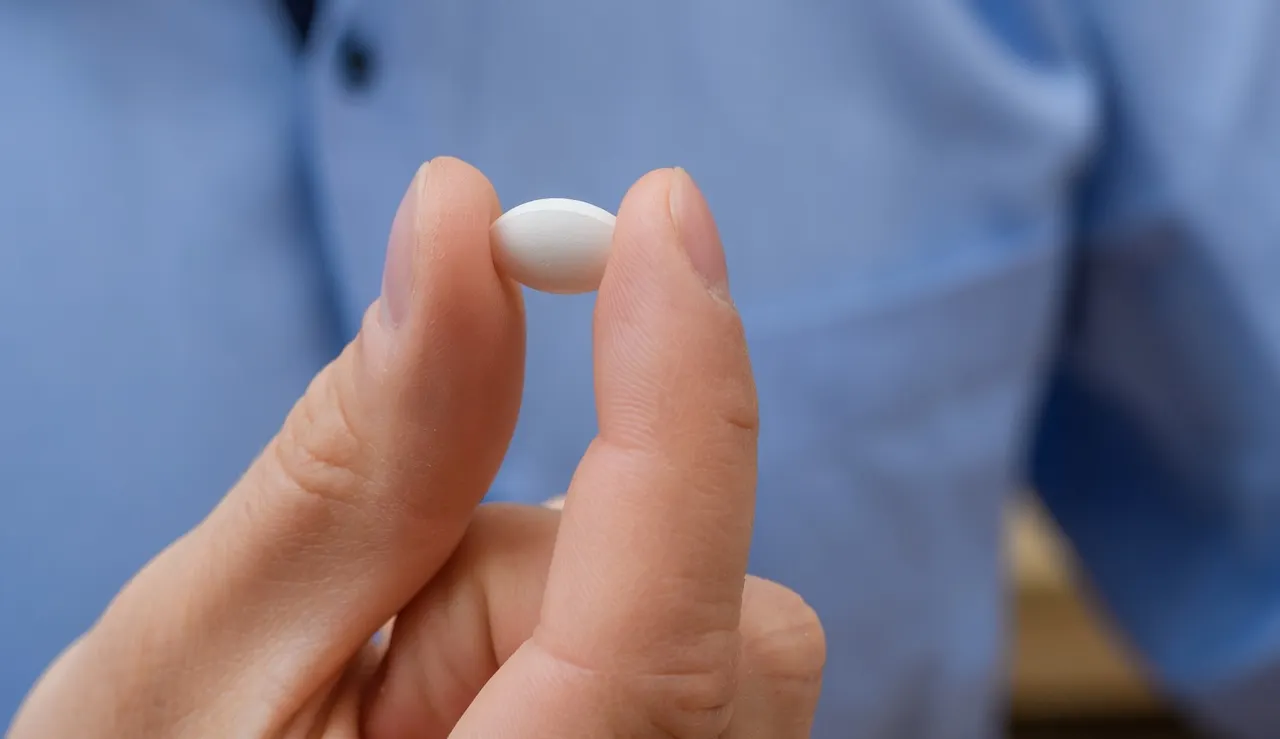
NEWYou can now listen to Fox News articles!
The Trump administration has expressed interest in exploring psychedelics for their potential in treating PTSD and other debilitating mental health issues, various officials have shared.
“The Department shares the goal of ensuring that all Americans — especially our nation’s veterans — have access to safe and effective treatments for conditions such as PTSD, addiction and depression,” a spokesperson for the U.S. Department of Health and Human Services (HHS), run by Sec. Robert J. Kennedy Jr., said in a statement provided to Fox News Digital.
“Secretary Kennedy is committed to applying rigorous, evidence-based science to research efforts aimed at addressing these serious health challenges.”
FDA APPROVES FIRST AI TOOL TO PREDICT BREAST CANCER RISK
In recent years, researchers have been actively investigating the potential of psychedelics, such as MDMA and psilocybin (“magic mushrooms”) to treat mental health disorders.
MDMA is not approved for clinical use by the U.S. Food and Drug Administration (FDA), but can be studied in clinical settings.
Psychedelics research has gained support from the Trump administration for treating PTSD and mental health conditions. (iStock)
Psilocybin is listed as a Schedule I substance under the Controlled Substances Act, which means it has “a high potential for abuse, [is not] currently accepted for medical use in treatment in the United States, and [has] a lack of accepted safety for use under medical supervision.”
Psilocybin-assisted therapy, however, is legal in Oregon, Colorado and New Mexico.
‘Showing promise’
Psychedelic medicines are “showing real promise,” according to Dr. Luke Twelves, general practitioner and vice president of medical for Lindus Health in London.
Clinical trials have found such treatments safe and effective for patients battling serious mental health issues, according to Twelves.
COMMON SUPPLEMENTS AND MEDICATIONS COULD CAUSE LIVER DAMAGE, STUDIES SHOW
“Take psilocybin, for example — it’s demonstrating remarkable results for severe depression that hasn’t responded to other medications,” he told Fox News Digital. “MDMA is showing similar breakthroughs for PTSD treatment.”
Clinical trials are also investigating how psychedelics could help with end-of-life anxiety, addiction, eating disorders, chronic pain and OCD, he added.
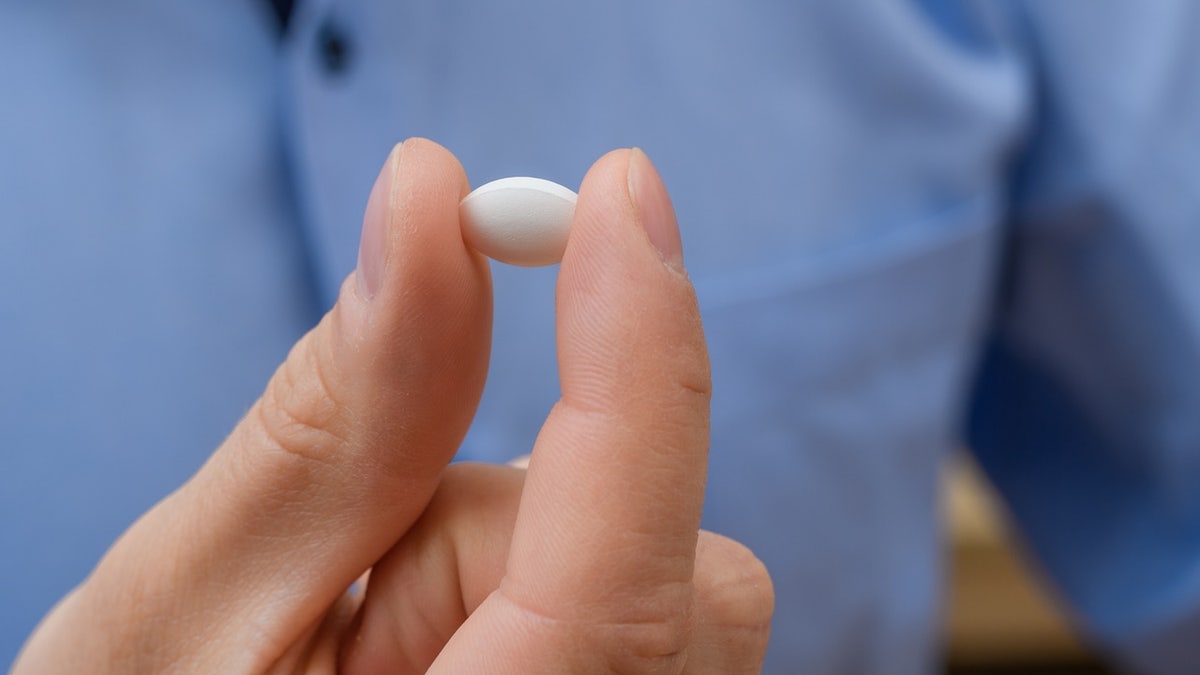
In recent years, researchers have been actively investigating the potential of psychedelics, such as MDMA and psilocybin to treat mental health disorders. (iStock)
Researchers have faced challenges in terms of regulatory hurdles and proper placebo controls, Twelves said.
“Given that these treatments could transform [the] lives of people suffering from conditions where nothing else has worked effectively, it’s crucial that we complete this research properly,” he said. “The goal is to bring safe, proven psychedelic therapies to the patients who need them most.”
Potential for veterans
At President Trump’s May 1 cabinet meeting, Department of Veterans Affairs Secretary Doug Collins said that “we’re opening up the possibility of psychedelic treatment.”
Retired Army Sergeant Jonathan Lubecki recently told Fox News’ Alexandria Hoff that MDMA stopped his PTSD while he was participating in a clinical trial.

The VA is now opening up to the possibility of psychedelic treatment to promote the health of veterans. (iStock)
“[I] took my first dose of MDMA. I’ve only taken it three times as part of the clinical trial, haven’t taken it since, and haven’t found the need to take it since, because I haven’t had PTSD,” he said.
Peter Kasperowicz, Department of Veterans Affairs press secretary, told Fox News Digital the department is safely exploring all avenues that promote the health of veterans.
FALLUJAH VET TURNS MEDAL OF HEROISM INTO A HEALING MISSION FOR FELLOW WARRIORS WITH SERVICE DOGS PROGRAM
“Preliminary findings have produced positive results on psychedelic-assisted therapies for treating mental health conditions,” he said.
The VA is currently running 11 clinical trials in various phases, with a total of some 800 veterans expected to participate.
“The goal of these trials is to determine whether compounds such as MDMA and psilocybin can treat veterans with post-traumatic stress disorder, treatment-resistant depressive disorder, major depressive disorder and potentially other mental health conditions,” said Kasperowicz.
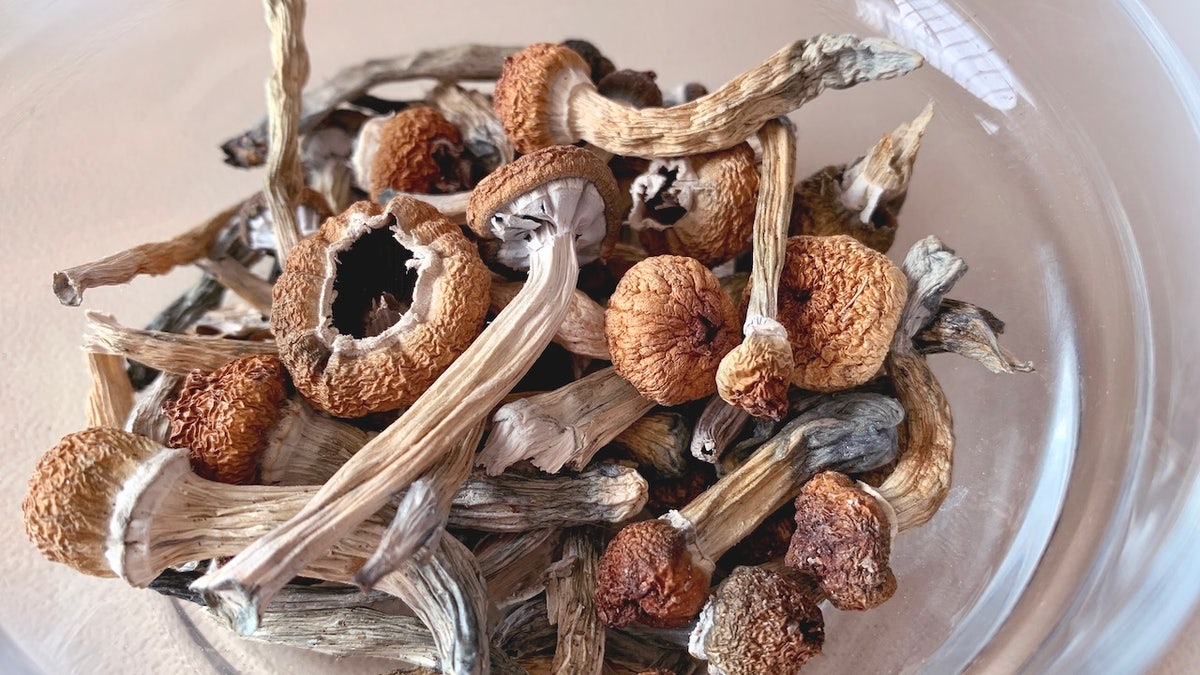
Psilocybin is a Schedule I drug under the Controlled Substances Act, but psilocybin-assisted therapy is legal in Oregon, Colorado and New Mexico. (iStock)
An MDMA study published in the Jan. 2025 issue of The American Journal of Psychiatry found that the substance is “unlike classical psychedelics.”
The study noted, “MDMA allows the individual to maintain intact ego functioning and a greater degree of cognitive and perceptual lucidity while still experiencing a prosocial altered state of consciousness that facilitates deeply emotional therapeutic breakthroughs.”
CLICK HERE TO SIGN UP FOR OUR HEALTH NEWSLETTER
The researchers concluded that MDMA showed “enhanced levels of trust, empathy, self-compassion and a ‘window of tolerance’” that traditional psychotherapy lacks.

The VA currently has 11 psychedelic clinical trials in various phases. (iStock)
Doug Drysdale, CEO of the Canadian pharmaceutical company Cybin, told Fox News Digital that “the time is now to address the mental health crisis.”
He said it is “gratifying” that administration officials value the potential benefits of looking into alternative mental health treatments.
“The time is now to address the mental health crisis.”
Cybin is currently in phase 3 of a study of CYB003, a type of psilocybin that has been granted breakthrough therapy designation by the FDA as an additional treatment for major depressive disorder (MDD).
“In Cybin’s completed Phase 2 MDD study, long-term efficacy results showed that 71% of participants were in remission from depression, and 100% of participants responded to treatment at 12 months after just two 16 mg doses of CYB003,” said Drysdale.
Risks and cautions
Dr. Marc Siegel, clinical professor of medicine at NYU Langone Medical Center and Fox News’ senior medical analyst, previously interviewed two of the country’s top researchers on psychedelics — Dr. Rachel Yehuda, founder and director of the Center for Psychedelic Psychotherapy and Trauma Research at Mt. Sinai in New York, and Dr. Charles Marmar, director of the PTSD research program at NYU Langone.
“There is a huge downside in terms of unregulated recreational uses.”
“They agree there is therapeutic potential if very carefully studied under very strict medical guidance, but there is a huge downside in terms of unregulated recreational uses,” Siegel told Fox News Digital at the time.
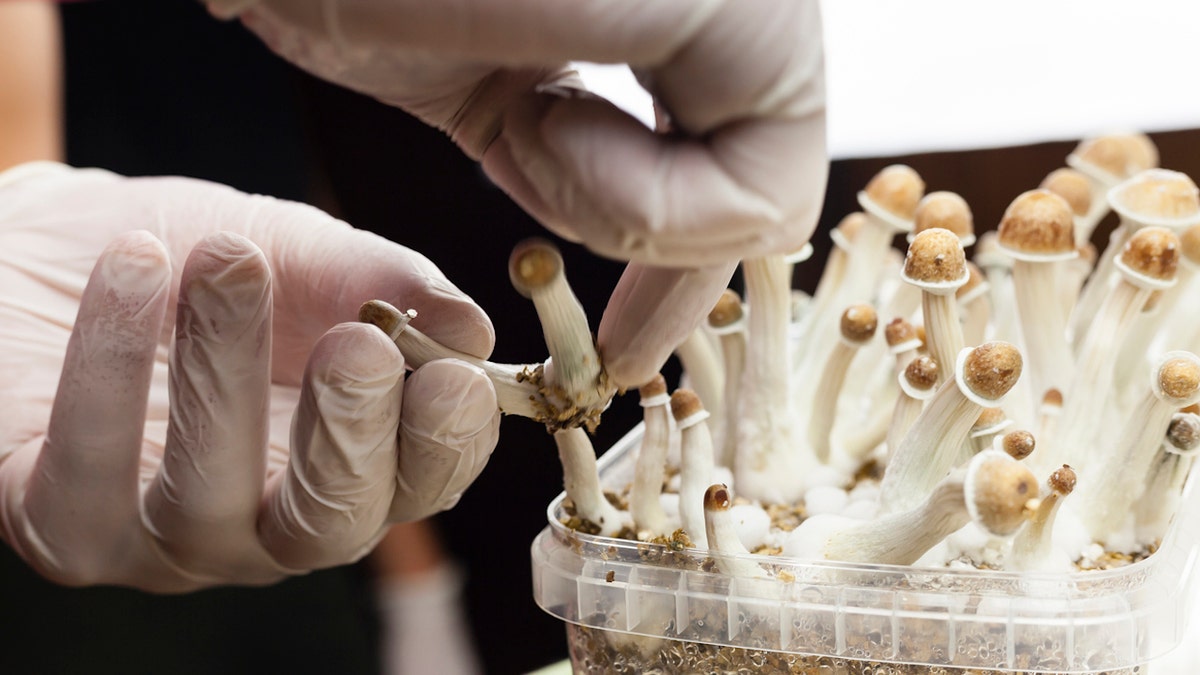
Experts emphasize the importance of administering psychedelics in a safe setting when treating mental health conditions. (iStock)
“Both doctors see likely therapeutic value to psychedelics if carefully managed by medical experts,” Siegel added.
Ryan Moss, chief science officer at Filament Health, a clinical-stage natural psychedelic drug development company in Canada, emphasized it’s important to administer psychedelics in a safe setting when treating mental health conditions.
For more Health articles, visit www.foxnews.com/health
“Psychedelic experiences can sometimes feature anxiety, hallucinations and paranoia,” Moss previously told Fox News Digital. “Some patients using traditional psychedelics have reported experiencing adverse cardiovascular events during clinical trials.”
To mitigate these risks, Moss recommended clinical trial participants receive thorough preparation and monitoring by trained professionals during sessions.
Melissa Rudy and Angelica Stabile, both of Fox News Digital, contributed reporting.
Health
Craving Sugar? Swap It for Healthy Fats and Watch Pounds Fall Off Stop Sugar Cravings Fast: How Healthy Fats for Weight Loss Keep You Satisfied

Use left and right arrow keys to navigate between menu items.
Use escape to exit the menu.
Sign Up
Create a free account to access exclusive content, play games, solve puzzles, test your pop-culture knowledge and receive special offers.
Already have an account? Login
-

 News1 week ago
News1 week agoVideo: Faizan Zaki Wins Spelling Bee
-

 News1 week ago
News1 week agoVideo: Harvard Commencement Speaker Congratulates and Thanks Graduates
-

 Politics1 week ago
Politics1 week agoMichelle Obama facing backlash over claim about women's reproductive health
-

 Technology1 week ago
Technology1 week agoAI could consume more power than Bitcoin by the end of 2025
-

 News1 week ago
News1 week agoPresident Trump pardons rapper NBA YoungBoy in flurry of clemency actions
-

 Technology1 week ago
Technology1 week agoSEC drops Binance lawsuit in yet another gift to crypto
-

 Technology1 week ago
Technology1 week agoOpenAI wants ChatGPT to be a ‘super assistant’ for every part of your life
-

 World1 week ago
World1 week agoTwo killed in Russian attacks on Ukraine before possible talks in Turkiye















